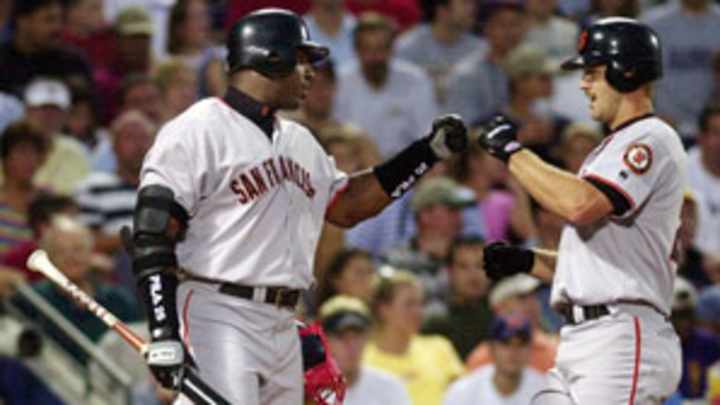A year after retiring, former Giant Jeff Kent is mending fences


Jeff Kent was never one for building bridges. Quite the opposite: he usually left wielding a blowtorch behind him.
But now, less than one year into his retirement, Kent has become a master craftsman -- hammering out connections and smoothing down his rough spots. A jovial turn on ABC's Superstars. A softer take on his nemesis Barry Bonds. And love not only for his former team the Giants, but also for the media that covered him.
The cynic would say the makeover is due to a place Kent always professed not to care about: Cooperstown. Kent will be on the Hall of Fame ballot in 2014. He has the numbers to support his induction -- he hit more home runs than any second baseman in history. And if he was trolling for some early votes he might have got them on Monday when he thanked the media for helping to clean up baseball's steroid problem.
"I'm embarrassed for my era," Kent said. He added, "I thank you guys for this. The game wouldn't be as clean as it is if you guys weren't involved, and for that I'm appreciative."
It almost sounded like a campaign speech. For years, Kent relished his reputation as a prickly, aloof player, who insisted he didn't care about statistics or records or the Hall of Fame because he wasn't a baseball fan.
Despite that indifference, Kent collected plenty of honors in his 17-year career, including a National League MVP award in 2000, five All-Star appearances and the title as the most productive second baseman in history.
Kent's career statistics were enhanced by playing with Bonds for six years, either batting ahead or behind the era's most feared player. The two men clearly couldn't stand each other. Kent said the public shoving match in the dugout in 2002 was just one of "a bunch of times we got after each other."
"We just didn't hit it off," Kent said. "We just didn't click. He needed someone to push him in order to play better. I took the role of the guy who stuck the nail in his shoe every now and then to make him jump. I took pride in that."
That Kent was an outspoken critic of steroid use and Bonds became the most high-profile of the accused only fueled the tension. But directly or not, Kent was a beneficiary of the era he views with embarrassment.
"Barry doesn't need friends; I don't need friends either," Kent said. "Everyone wanted to make such a big deal that we weren't friends. But it worked. And we won."
Kent's six years in San Francisco were not only his best, but also the best in recent Giants history. So it makes sense that he will be honored on the Giants Wall of Fame on Saturday. The tribute helps repair a relationship that was fractured after Kent's departure for Houston, following the 2002 season.
The cause wasn't just his difficult relationship with Bonds, the franchise's personal ATM. Things began to sour with the front office during spring training of that season, when Kent fractured his wrist. He told one tale -- that he was washing his truck -- but newspapers reported that he had been doing wheelies on his motorcycle.
That was one topic that produced the familiar acerbic Kent. "It will always stay a secret," he said Monday.
Kent became the most vilified player at AT&T Park, particularly when he returned with the rival Dodgers. The intense booing was an interesting reaction to a player who was a catalyst for the Giants' only World Series appearance in 19 years.
Kent, flashing his badger grin under his mustache, always appeared to enjoy the reaction. "It was a sign of respect and I saw it that way," Kent said.
But if he does make it into the Baseball Hall of Fame, he'll do it as a Giant. "Absolutely," he said. "All my accomplishments, my passion and my heart were left in San Francisco."
When Kent played for the Giants, he was just one more testy guy in a clubhouse filled with cranks. In retrospect, the job manager Dusty Baker did holding that testosterone-fueled irritable bunch together was remarkable, as Kent acknowledged.
"Dusty was the first to leave," Kent said. "And he had been our ringleader for how we played on the field. That opened up a wound there. That was the determining factor for why I didn't come back."
Kent has remade himself a few times in the past. A product of Southern California, he morphed into a Texas rancher, complete with drawl.
Now his latest chameleon act: from surly loner into a warm and fuzzy retiree. One who just might have his eye on his own legacy.
